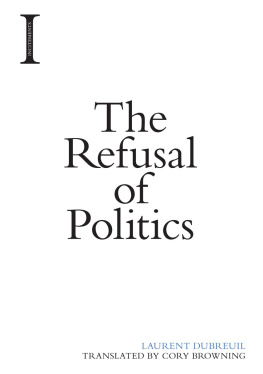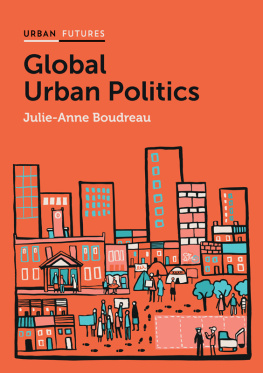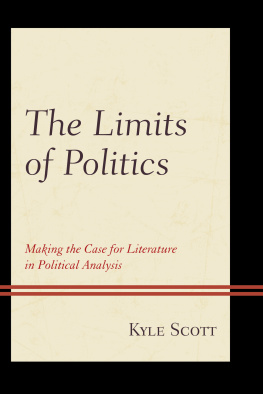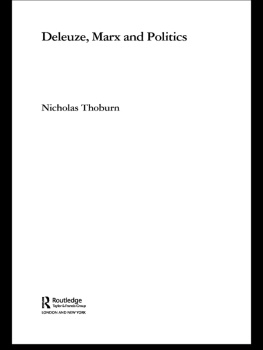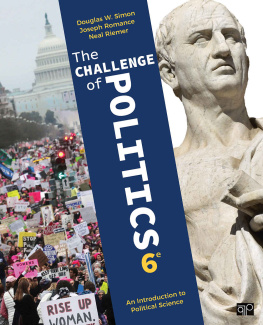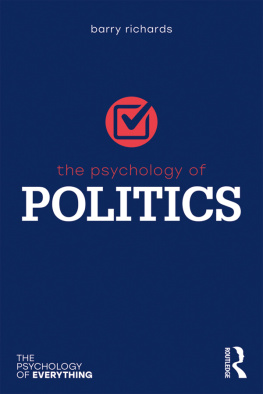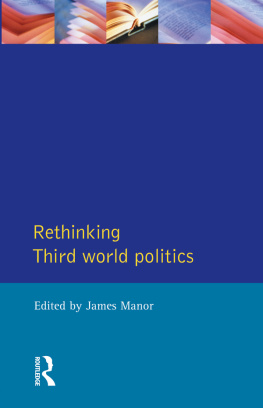The Refusal of Politics
Incitements
Series editors: Peg Birmingham, DePaul University and Dimitris Vardoulakis, University of Western Sydney
An incitement is a thought that leads to a further thought or an action that solicits a response, while also testing the limits of what is acceptable or lawful. The books in this series, by prominent, world class scholars, will highlight the political import of philosophy, showing how concepts can be translated into political praxis, and how praxis is inextricably linked to thinking.
Editorial Advisory Board
tienne Balibar, Andrew Benjamin, Jay M. Bernstein, Rosi Braidotti, Wendy Brown, Judith Butler, Adriana Cavarero, Howard Caygill, Rebecca Comay, Joan Copjec, Simon Critchley, Costas Douzinas, Peter Fenves, Christopher Fynsk, Moira Gatens, Gregg Lambert, Leonard Lawlor, Genevieve Lloyd, Catherine Malabou, James Martel, Christoph Menke, Warren Montag, Michael Naas, Antonio Negri, Kelly Oliver, Paul Patton, Anson Rabinbach, Gerhard Richter, Martin Saar, Miguel Vatter, Gianni Vattimo, Santiago Zabala
Available
Return Statements: The Return of Religion in Contemporary Philosophy
By Gregg Lambert
The Refusal of Politics
By Laurent Dubreuil, translated by Cory Browning
Plastic Sovereignties: Agamben and the Politics of Aesthetics
By Arne De Boever
From Violence to Speaking Out: Apocalypse and Expression in Foucault, Derrida and Deleuze
By Leonard Lawlor
Forthcoming
Agonistic Mourning: Political Dissidence and the Women in Black
By Athena Athanasiou
The Refusal of Politics
Laurent Dubreuil
Translation by Cory Browning

Edinburgh University Press is one of the leading university presses in the UK. We publish academic books and journals in our selected subject areas across the humanities and social sciences, combining cutting-edge scholarship with high editorial and production values to produce academic works of lasting importance. For more information visit our website:
edinburghuniversitypress.com
Le Refus de la politique, Laurent Dubreuil, Hermann diteurs, 2012
English translation Cory Browning, 2016
Edinburgh University Press Ltd
The Tun - Holyrood Road, 12(2f) Jacksons Entry, Edinburgh EH8 8PJ
A CIP record for this book is available from the British Library
ISBN 978 1 4744 1677 1
The right of Laurent Dubreuil to be identified as the author of this work has been asserted in accordance with the Copyright, Designs and Patents Act 1988, and the Copyright and Related Rights Regulations 2003 (SI No. 2498).
Contents
Opening Opinion
No. This no that is currently rising and rumbling on each and every stage of power is ancient; it is also new. Ancient in that every great political demand contains the possibility of larger objection, one that goes against the government of politics itself, and not just in this or that form, whether forged in elections, technocratism, accumulation of wealth, or force. New to the extent that numerous contemporary movements in Asia, Africa, Europe, the Americas are posing sharper questions about the risk of a return to order by their own hand. Disdain for official politics, widely shared throughout the world, is not in itself demobilisation. The indignados in the streets, peasants illegally cultivating land zoned for construction, protestors who occupy a putatively public space, in their vast refusal and their will to eschew disciplined organisation, they are all saying no to what lurks beneath political circumstance. But how difficult it is to see clearly the amplitude of this refusal! How impossible it might seem not to fall back into ordinary combat, to go beyond anti-politics without getting caught up in the more or less realist fantasy of an alternative polis!
In their successes and failures, these rebels remind us that our existences in the City do not mesh with the farce of political it is high time to refute the control of all by all, right down to the principles that justify the transcendent order of the City. We must hold the course and go so far as to refuse politics.
Hows that? A desire to leave politics at the moment when the electronic winter of conformed global thought is taking hold, thought that dominates 3D inanity and whose internal pacification in the principal HQs rests on perpetual warmongering, impassioned populism and an informant mentality? Ah, I dont pretend that that doesnt leave things unchanged. Im saying it isnt everything, that the hold of politics will not be eliminated by attacking only this or that programme, and that working outside programmability is all that remains. In that regard, the most harrowing problem is not abstention, nor vexation or exploitation: rather it is to cling to the vain belief that all the ills of politics could have a political solution.
The best politics strives to promote the collectivitys ability to live well [bien vivre], and it faces great difficulties in rising to this challenge. Let us help it then, contributing in our own way; let us denounce it if need be; let us not be dumbfounded by the rhetoric of divine right, the fait accompli or the laws of the system. But above all, I want to live better. According to the logic of their mandates, the forces of the City tend to reduce the scope of the real to their strict purview, all the more so given that their actions fail so blatantly. Ramparts were not built yesterday; however contemporary history is distinct in the construction of ever greater walls and in its sophisticated engineering. Todays planetary politics puts great stock and energy into concealing the outside of the polis as well as what the arts, feelings, thought, intensity, the inconstructible hold up in relief against capital Order and its insidious proclamations that all is given, neutral or done. The unbearable managerial discourse, the increased domination over the living, the permanent circus of elected representatives and managers, the gigantic enterprise of informative ideas, the destruction or systematic enslavement of certain animal groups humans or others should be met with revolt, uprisings, rebellions, revolutions. But that is not enough.
Desire for defiance permeates our times. Some of the recent anti-establishment movements are cause for concern in the official organisation of the world. Rather than working within a determined programme or making demands for a reassessment, these groups first target an essential institution of power: the tyrant during the Arab Spring; the centralising, planning state in France; continental China in Hong Kong; the economy of sports and the spectacular in Brazil; Wall Street or Washington in the United States; the European Bank in Greece. By calling it into question in this way tacitly understood as radical within the societies in question these movements leave little room for the usual revolving door of politics, since the majority of eligible parties already participate in the system being denounced. That there is an effective absence of perspective on an organised revolution only reinforces de facto the significance of this no, rather than rendering it vain, as the old Marxist or conservative interpretation doggedly insists. At the same time, these movements are galvanising new efforts at auto- or self-organisation, ranging from the creation of a parallel space of communication via the internet to the realisation of communes

